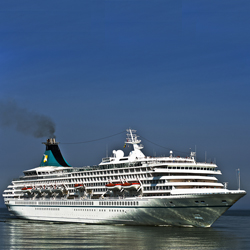 I started on a fairly typical career path after qualification from the University of Leicester in 2001. I rotated through SHO posts in a variety of different specialities relevant to Emergency Medicine, my then career choice.
I started on a fairly typical career path after qualification from the University of Leicester in 2001. I rotated through SHO posts in a variety of different specialities relevant to Emergency Medicine, my then career choice.
Just as ‘Modernizing Medical Careers’ was being introduced in 2006 I was working as an A&E middle-grade in Manchester and studying for my membership to the College of Emergency Medicine (MCEM) exams. Once I had the exam I basically had two choices – apply for one of the last few ‘old-style’ SpR posts in emergency medicine or try something different. I chose the latter and applied for the position of ship’s doctor, having heard about the job from an old medical school friend who was presently working for the company and loving the experience.
Up until I applied for the job at sea, I hadn’t done much travelling but had always wanted to; this job seemed to appear on the horizon at just the right time. I decided that before I ended up on conveyer belt heading towards A&E consultancy, I would take a break from the conventional path and try something very different.
Our ships carry anything up to 4500 people, a mixture of multi-national passengers and crew and we sail to the common ‘cruise’ destinations such as the Caribbean and the Mediterranean but also to places further afield such as Australia, South and Central America, the Pacific Islands, Alaska and our ‘Grand Voyages’ have amazing worldwide itineraries.
I have been lucky enough to visit some amazing places and, in the equivalent of my lunch break, I have walked up the Sydney harbour bridge, stood gazing at the ceiling of the Sistine chapel, walked along the Great Wall of China, seen the Pyramids of Egypt and climbed glaciers in Norway. I would never have had the opportunity to see so many places and experience so much in a NHS position.
As the senior doctor (most ships have two doctors and between two and five nursing officers) I am accountable to the Captain and sit on the ship’s executive officer committee. I am in charge of the ship’s medical centre – my current ship has an eight bedded facility with three of those beds being intensive care/coronary care equivalent.
Working Life
On a daily basis I run two open-access passenger clinics per day and my colleague runs a similar service for the crew. Out of hours we have a 24-hour emergency on-call with the nursing officers being the primary responders and the doctors taking the on-call responsibility in turns.
We can see anything between five and fifty new patients per day depending on the age demographic of the passengers and the itinerary of the ship. Our case load can encompass anything from motion sickness or a cut finger right up to myocardial infarction, or cardiac arrest. We have extensive onboard facilities including x-ray and laboratory testing as well as the capability to perform cardiac monitoring, invasive & noninvasive ventilation, thrombolysis, central venous access, adult and paediatric life support resuscitation, blood transfusion, orthopaedic fracture management and minor surgical procedures.
I am the public health officer for the ship and am actively involved in the ship’s operational management as well as a member of the ship’s health, safety, hygiene and environmental committee. As a medical team we regularly practice our emergency response (for either a medical or other emergency such as fire) during mandatory drills and training exercises. Additional non-medical responsibilities are more pleasurable and dining with passengers or entertaining passengers at cocktails parties is expected of the ship’s senior officers.
As an executive officer within the company my remuneration package is very good. I have the company’s private health insurance and am a member of the pension scheme. My pay-scale is equivalent to a senior registrar/junior consultant’s wage in the NHS – the one added bonus being that, as a seafarer working outside of the UK, I am exempt from UK income tax; hence my wages are paid gross.
I have minimal onboard expense with essentially free (serviced) accommodation and no food bills. With that said, the clinical commitment is unyielding with a daily service (weekends no exception) and frequent nights on-call but this is balanced by the opportunity to travel to amazing worldwide destinations and serve as a high-ranking merchant seaman.
Carry on Cruising
The perception of a cruise ship doctor is often clouded by thoughts of ‘The Love Boat’ or ‘Carry on Cruising’, but it could not be further from the truth. There is a new breed of younger, more emergency-focussed doctors coming through and whether they stay for one or two years or decide to make a career out of maritime medicine, they usually have a very enjoyable experience. I certainly have.
My previous emergency and anaesthetic experience has certainly not been wasted as I have been involved in numerous cardiac resuscitations, intubated and ventilated many seriously ill patients at sea and arranged emergency medical evacuations for critically ill patients to shore side hospitals by land, sea or air. No two days are ever the same and the pace can range from relaxed to frantic depending on what sort of patients you are seeing and where in the world you are.
One memorable day was when, enroute to Reykjavík in Iceland, we had a elderly man in complete heart block hooked up to our external pacer and then had to urgently call for blood donors when a young man presented to the medical centre with a towel full of fresh haematemesis. Both passengers were disembarked – one for a pacemaker and one for a laparotomy.
We carry no blood stocks onboard so rely on those passengers who are known blood donors to come forward. We venesect and transfuse using special donor kits after performing onboard HIV and Hepatitis B tests. Shortly after sailing that same day passenger came down with sudden loss of visual acuity in one eye and features of a retinal detachment. We organised a medical evacuation via the Icelandic coastguard and he was airlifted for urgent retinal surgery which restored his sight to normal.
During one busy clinic after sailing from Sydney we had over a hundred motion sick Australians to see as the weather leaving the Sydney harbour is notoriously rough. One man walked into the medical centre, vomited and collapsed. The nurses shot him looks of distain until we realised that he wasn’t breathing and his extensive anterior myocardial infarction had cause him to vomit, not the weather! He was intubated and remained in our medical centre for 24 hours on inotropic support until we could enter the nearby port of Newcastle and evacuate him to an intensive care unit.
You learn to become more resourceful when working at sea as the specialist opinion is a lot further than a phone call away. We image-link all of our onboard x-rays to a group of radiology associates in the USA, who provide reports by return e-mail. We have full internet access as well as a computer-based forum connecting all the ships in the fleet together – this is an excellent resource for sharing knowledge, obtaining a second opinion or discussing clinical management of cases.
In certain circumstances we will ask for an opinion from a shore-based specialist by phone (if we are at sea) but often we simply make a referral to a hospital specialist in one of our ports of call with the assistance of our local manning offices and port agencies. In addition to the medicine you have to be skilled in basic dentistry which is something you learn on the job, much like how to perform the blood tests, maintain malfunctioning medical equipment and take and process x-rays – none of which falls into your remit as a land-based doctor.
When I am on leave my time is my own and typically I will be at sea for four months and off for two. I am a medical director for the Advanced Life Support Courses and like to teach a couple of courses each time I am on leave – this keeps my resuscitation skills up as well. I also instruct on the prehospital care course run by the British Association of Immediate Care (BASICS) and I am currently studying for my Diploma in Immediate Care. I am lucky enough to have a long stretch of leave all together which permits nice holidays and time to catch up with family and friends I haven’t seen whilst I’ve been at sea.
If you have a love of travelling and like to challenge yourself clinically then working at sea may be for you. The lifestyle is very different and the pace and way of working takes some getting used to, but I have thoroughly enjoyed my time as a ship’s doctor and would wholeheartedly recommend the position to others.
Dr Philip Brooks



